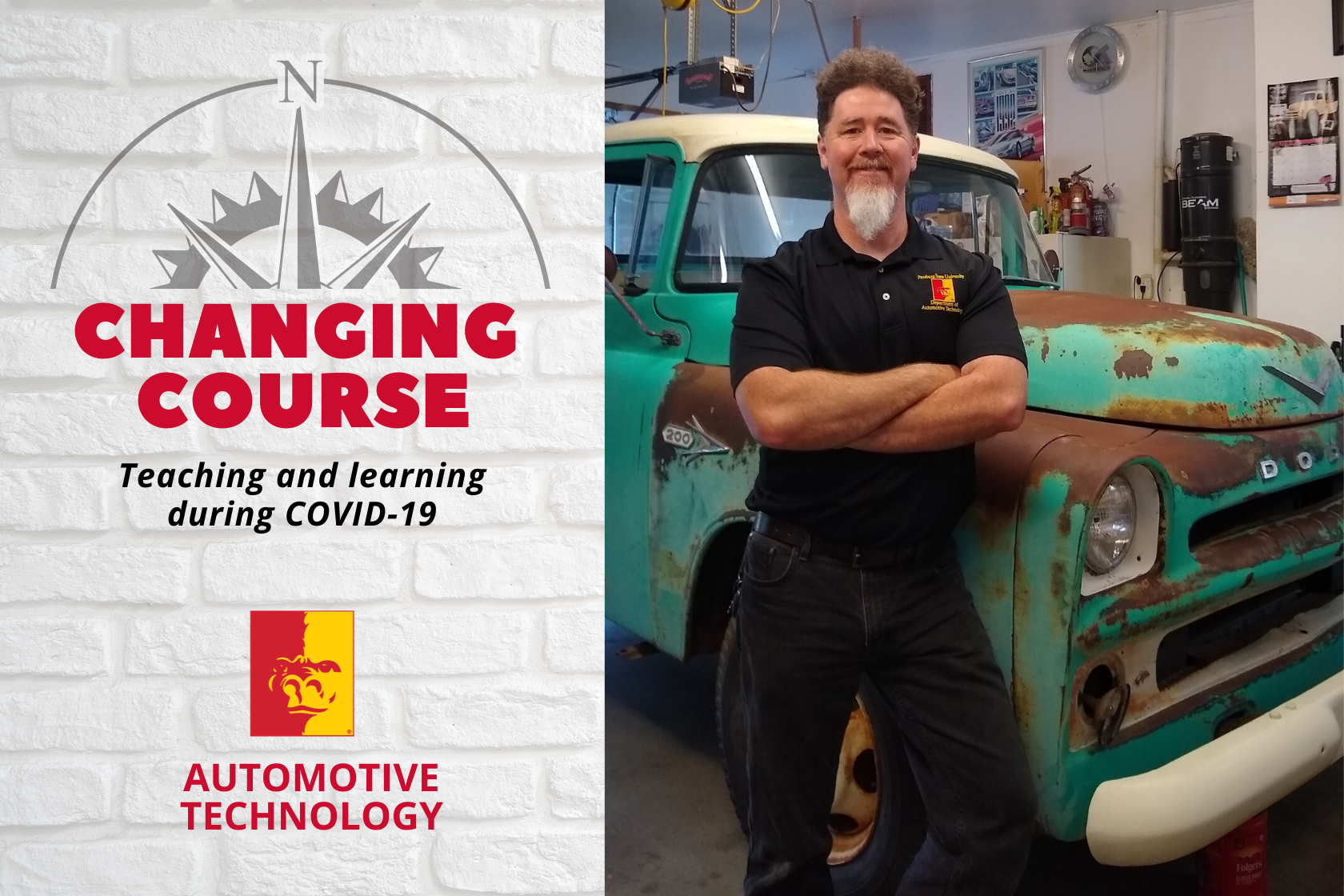Changing Course: Auto tech professor starts own YouTube channel
Thursday, April 23, 2020 1:30 PM
News, Science and Technology, People and Society
Pittsburg, KS

Just as the spring edition of the PittState Magazine arrived in mailboxes across the nation, touting as the cover story the theme “By Doing, Learn,” for which the university is known, the COVID-19 pandemic brought all in-person classes to a halt.
Those who teach and those who learn had to be flexible, innovative, and change course quickly.
In this series, we’re sharing what education looks like from the perspective of our faculty, students, and alumni during a time of social distancing, stay-at-home orders, and remote coursework.
So how does a professor who ordinarily teaches students the hands-on aspects of engines in person, over the hood of a car, deliver the information virtually — information that they will need when they’re working in industry in a few months?
While he may never go viral, Scott Norman, aka “Professor Pentane,” created a YouTube channel.
“I’m looking at this pandemic positively; it allows me to stop and take a breath, be creative, think outside the box, and do fun things I think will benefit my students,” he said.
In them, Norman shows off his ‘57 Dodge in his home garage. And, he uses the equipment in the lab, now empty of other people, at the Kansas Technology Center.
“They’re not polished, not fancy, just raw footage, and I’m learning as we go,” he said.
He also uses his 30 years of experience in automotive technology in his videos. He started as a technician with a two-year degree, then earned his bachelor’s at PSU in 1990. GM hired him right out of college as a trouble-shooter in diagnostics.
Chrysler then hired him as a training instructor. In 2007, he joined the faculty at PSU, and now he’s educating students to do what he once did.
“We have one of the best automotive schools in the U.S.,” he said.
Creating such videos has been on his “to do” list for five years. It took a global pandemic to make it happen.
“We’re so busy with companies coming to visit, automotive orientation days, students in and out, maintaining the labs and equipment — there’s so much to do besides teaching class. I always wanted to provide videos as a resource, but just never had the time,” he said. “This was the right time.”
The videos will help not just students, he noted, but also graduates.
“By the time they get out into their jobs they might forget a few things, so naturally they turn to YouTube. But I’m finding they can get a lot of bad info there,” he said. “This gives them something reliable to refer to now, and then again later when they need it.”
Others
Professor Tim Dell, who has used VidGrid to record the rest of the semester’s presentations for his classes, sees a silver lining; he is visiting with students to get their input about online delivery of theory and assessments, because continuing it once face to face classes resume could free up more time to spend in the lab.
Associate Professor Steve Polley had been providing his students online quizzes, tests, Powerpoints, and other resources for a few years, so moving to online instruction was relatively smooth. He’s added Zoom demonstrations using his own car at home and has invited industry guests for talks. Attendance has been good: of his 22 students, 19 regularly attend class.
Faculty members Chauncey Pennington, Mike Elder, Trent Lindbloom, Randy Jones, Nico Prelogar, and Kindra O’Conor, also have turned to video in place of lab demos, have learned to employ best practices like lock-down functions for online tests, are giving students multiple attempts to take quizzes and are throwing out low scores, and are making an extra effort to reach out to students by email and text to keep them engaged — particularly those who don’t check in via Canvas.
Job prospects
Transportation continues to be one of the top 10 fields in the U.S., faculty agreed.
“They can go to dealerships and up the ranks, or go to corporate, to Tier 1 manufacturers,” Norman said. “Even going through recessions, the industry is so big, there won’t be a shortage of jobs. They can’t fill them all. Students might not go into specifically what they want to do within the industry, but they’ll have something. We will always need people who understand cars – they’re a complex piece of machinery.”
Also in this series:
How two professors of chemistry, along with their college student son, are teaching and learning from a hotel room after their home was badly damaged by a fire. Read.
How nursing students are completing clinicals virtually. Read.
How students in Environmental & Safety Management are using this real-world pandemic to write emergency plans for companies. Read.
How an art teacher has used the pandemic as a theme for an online art exhibit open to students and the community. Read.
How two graduates of the Music Education program are teaching hundreds of students from their tiny downtown loft apartment using innovative strategies. Read.
How the PSU Wind Ensemble has collaborated to practice and produce music virtually. Read.